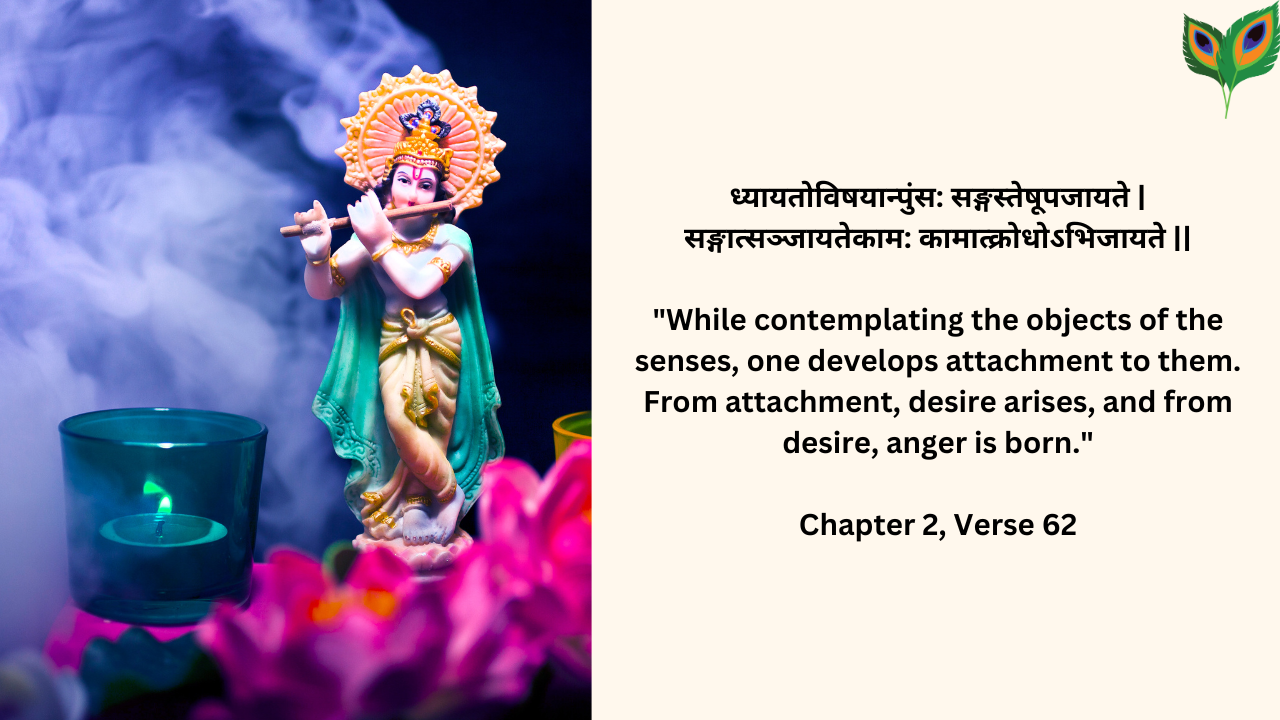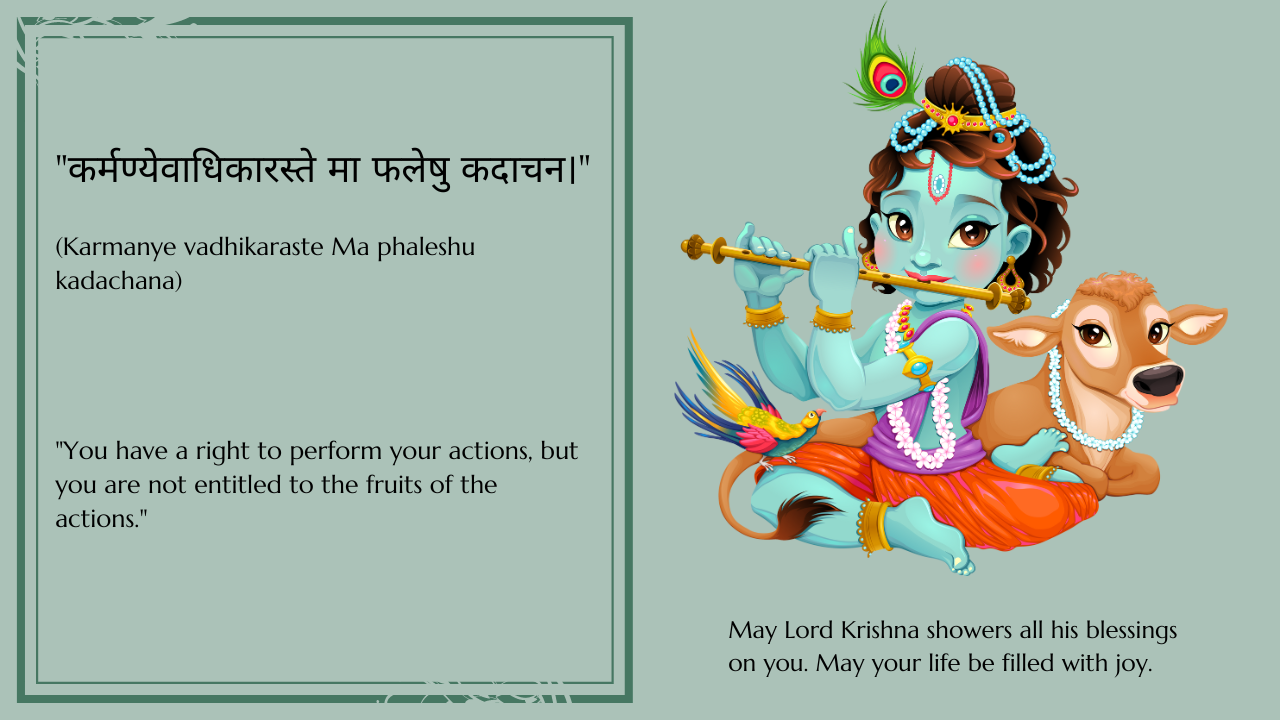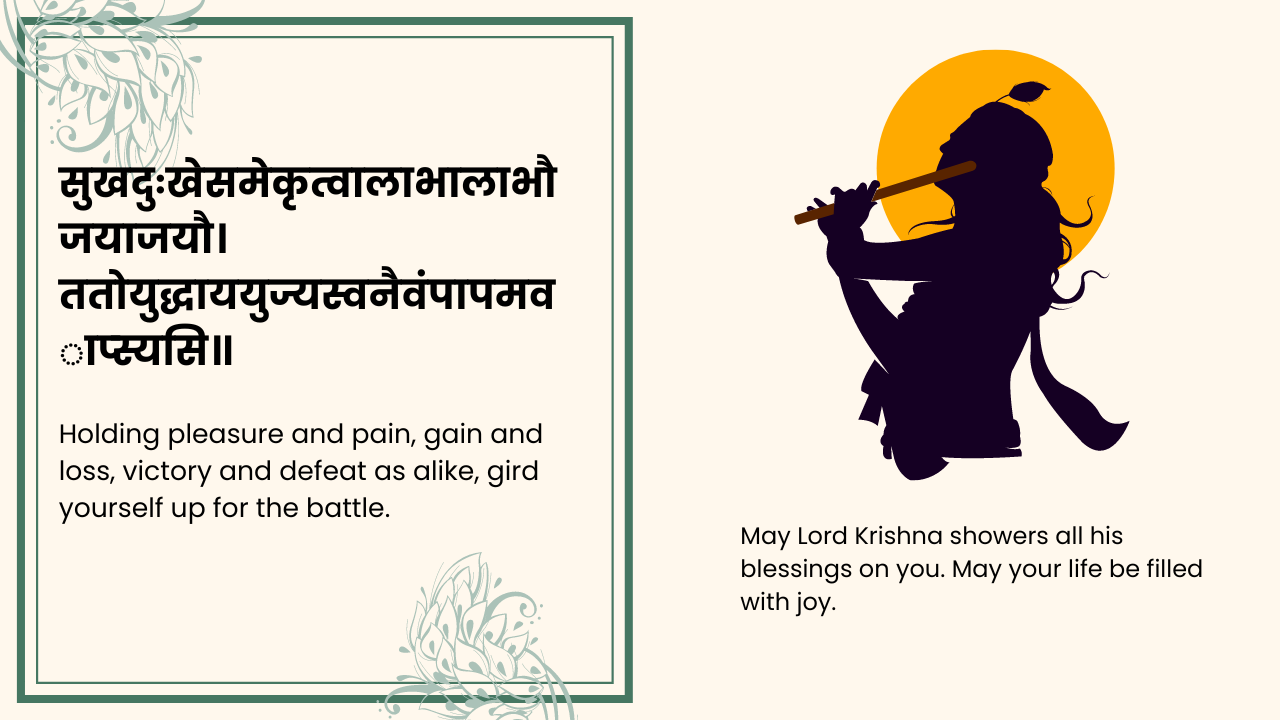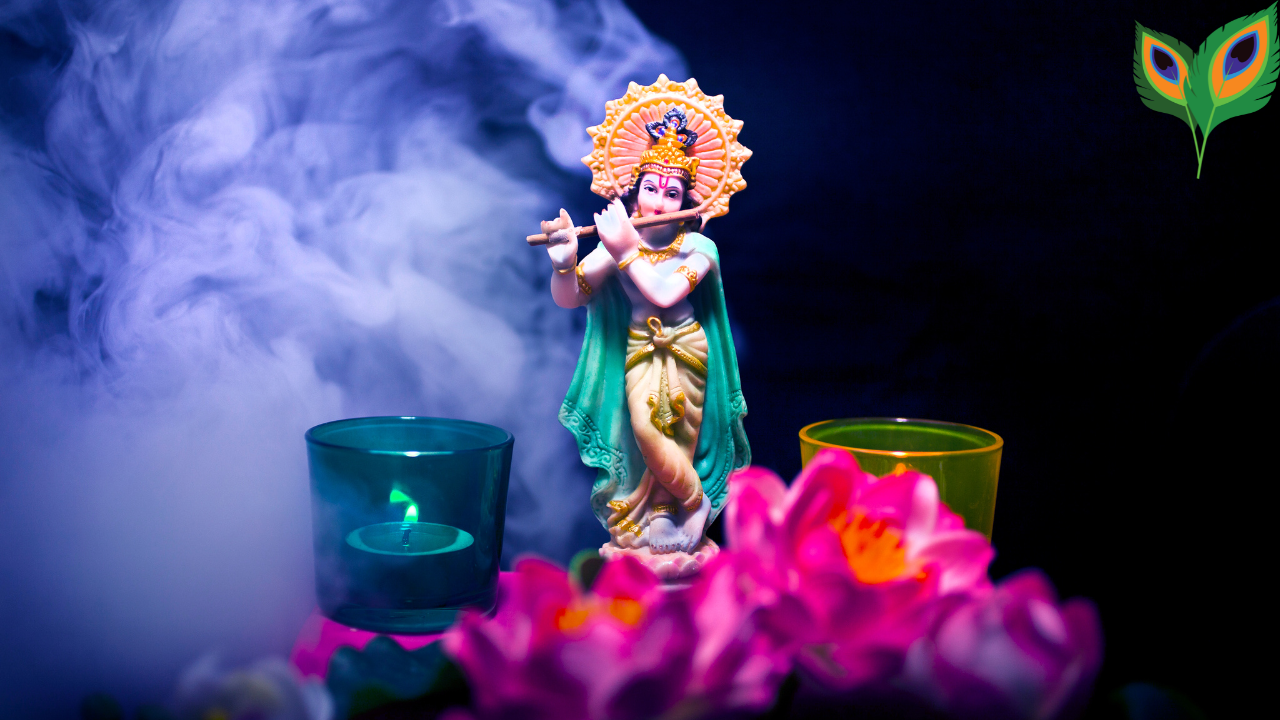ध्यायतोविषयान्पुंस: सङ्गस्तेषूपजायते |
सङ्गात्सञ्जायतेकाम: कामात्क्रोधोऽभिजायते ||
Focusing on sensory objects fosters attachment, which leads to craving, and from craving arises anger.
The Bhagavad Gita, often known as the "Song of the Spirit," refers to the teachings of the Spirit through the soul and the divine communion of truth-realization between man and his Creator. The Gita's 700 short verses contain vast wisdom that unites the fundamental principles of all great global scriptures. The Gita contains all of the known information about the universe.
हरे कृष्ण हरे कृष्ण कृष्ण कृष्ण हरे हरे
हरे राम हरे राम राम राम हरे हरे
Hare Krishna, Hare Krishna, Krishna Krishna, Hare Hare
Hare Rama, Hare Rama, Rama Rama, Hare Hare”
Followers recite this sacred mantra to elevate themselves to a higher spiritual realm and transcend into a divine world, establishing a direct connection between their souls and Lord Krishna.
The Gita has been understood and implemented on all levels of human activity and spiritual striving, spanning a huge spectrum of human beings with their various natures and needs. It is supremely profound while couched in the revelatory language of solacing beauty and simplicity.
Lord Krishna, one of Hinduism's most important deities and the personification of love, is referred to as the God of protection, compassion, tenderness, and love. In the Mahabharata, Krishna rides Arjuna's chariot at the Battle of Kurukshetra, and the Pandavas prevail over the Kauravas under his wise leadership. At the battle of Kurukshetra, Lord Krishna responded to a perplexed Arjuna's request for counsel by offering some logical philosophical ideas that are still valid today.

Lord Krishna Sanskrit Quotes From Bhagavad Gita 🕊️
The context of the Bhagavad Gita is found within the Mahabharata, a massive epic composed of about 200,000 verses, where it serves as a critical philosophical work.
जातस्य हि ध्रुवो मृत्युर्ध्रुवं जन्म मृतस्य च।
तस्मादपरिहार्येऽर्थे न त्वं शोचितुमर्हसि॥ २-२७
जन्मने वाले की मृत्यु निश्चित है और मरने वाले का जन्म निश्चित है इसलिए जो अटल है अपरिहार्य है उसके विषय में तुमको शोक नहीं करना चाहिये।
Death is certain for the born, and re-birth is certain for the dead; therefore you should not feel grief for what is inevitable.

वासांसिजीर्णानियथाविहायनवानिगृह्णातिनरोऽपराणि।
तथाशरीराणिविहायजीर्णान्यन्यानिसंयातिनवानिदेही।।
vāsānsi jīrNāni yathā vihāya navāni grihNāti naro.aparāNi.
tathā śarīrāNi vihāya jīrNānyanyāni sanyāti navāni dehī.
The soul or atma sheds its worn-out physical body and takes residence in a new body at regular intervals. The state of the physical body, which deteriorates over time and is therefore impermanent, does not represent the truly unchangeable and permanent nature of the soul within it. The eternal does not move from place to place, but the embodied soul moves from one abode to another.
Feeling sad about your losses will only weigh you down.
Accept your desires without coveting or needing that which you want.
सङ्कल्पप्रभवान्कामांस्त्यक्त्वासर्वानशेषत: |
मनसैवेन्द्रियग्रामंविनियम्यसमन्तत: ||
शनै: शनैरुपरमेद्बुद्ध्याधृतिगृहीतया |
आत्मसंस्थंमन: कृत्वानकिञ्चिदपिचिन्तयेत् ||
"Having renounced all desires that arise from the mind, and having restrained the senses completely, gradually, step by step, with firm determination and a well-controlled mind, one should focus on the self, and should think of nothing else."
Yoga Vasistha
Lord Krishna Quotes In Sanskrit From the Gita [with Translation]
The Gita will illuminate that part of the trip, no matter where one is on the path leading back to God. This holy book illuminates the way of righteousness for those who appear lost, offers a clear overview for those who appear perplexed, and, in the end, imparts an enormous insight to everyone, regardless of age.
Here are a few of Lord Krishna's most important lessons for people today, as enshrined in the Bhagavad Gita.
वासांसिजीर्णानियथाविहायनवानिगृह्णातिनरोऽपराणि।
तथाशरीराणिविहायजीर्णान्यन्यानिसंयातिनवानिदेही।।
From Chapter 2, verse 22
"Just as a person puts on new garments after discarding the old ones, similarly the soul accepts new material bodies after casting off the old and useless ones."
This verse is part of Lord Krishna's teachings to Arjuna on the nature of the eternal soul and the process of transmigration. It highlights the concept of the soul's eternal nature and its journey through different physical bodies.

योगस्थ: कुरुकर्माणिसङ्गंत्यक्त्वाधनञ्जय |
सिद्ध्यसिद्ध्यो: समोभूत्वासमत्वंयोगउच्यते |
yoga-sthaḥ kuru karmāṇi saṅgaṁ tyaktvā dhanañjaya
siddhy-asiddhyoḥ samo bhūtvā samatvaṁ yoga uchyate
Yoga-sthaḥ—being steadfast in yog; Kuru—perform; Karmāṇi—duties; Saṅgam—attachment; Tyaktvā—having abandoned; Dhanañjaya—Arjun; Siddhi-asiddhyoḥ—in success and failure; Samaḥ—equipoised; Bhūtvā—becoming; samatvam—equanimity ; Yogaḥ—Yog; Uchyate—is called
Be steadfast in the performance of your duty, O Arjun, abandoning attachment to success and failure. Such equanimity is called Yog.
ध्यायतोविषयान्पुंस: सङ्गस्तेषूपजायते |
सङ्गात्सञ्जायतेकाम: कामात्क्रोधोऽभिजायते ||
dhyāyato viṣhayān puṁsaḥ saṅgas teṣhūpajāyate
saṅgāt sañjāyate kāmaḥ kāmāt krodho ’bhijāyate
While contemplating on the objects of the senses, one develops an attachment to them. Attachment leads to desire, and from desire arises anger.
अज्ञश्चाश्रद्दधानश्चसंशयात्माविनश्यति |
नायंलोकोऽस्तिनपरोनसुखंसंशयात्मन: ||
ajñaśh chāśhraddadhānaśh cha sanśhayātmā vinaśhyati
nāyaṁ loko ’sti na paro na sukhaṁ sanśhayātmanaḥ
But persons who possess neither faith nor knowledge and who are of a doubting nature, suffer a downfall. For skeptical souls, there is no happiness either in this world or the next.
सङ्कल्पप्रभवान्कामांस्त्यक्त्वासर्वानशेषत: |
मनसैवेन्द्रियग्रामंविनियम्यसमन्तत: ||
शनै: शनैरुपरमेद्बुद्ध्याधृतिगृहीतया |
आत्मसंस्थंमन: कृत्वानकिञ्चिदपिचिन्तयेत् ||
saṅkalpa-prabhavān kāmāns tyaktvā sarvān aśheṣhataḥ
manasaivendriya-grāmaṁ viniyamya samantataḥ
śhanaiḥ śhanair uparamed buddhyā dhṛiti-gṛihītayā
ātma-sansthaṁ manaḥ kṛitvā na kiñchid api chintayet
Saṅkalpa—a resolve; Prabhavān—born of; Kāmān—desires; Tyaktvā—having abandoned; Sarvān—all; Aśheṣhataḥ—completely; Manasā—through the mind; Eva—certainly; Indriya-grāmam—the group of senses; Viniyamya—restraining; Samantataḥ—from all sides; Shanaiḥ—gradually; Uparamet—attain peace; Buddhyā—by the intellect; Dhṛiti-gṛihītayā—achieved through determination of resolve that is in accordance with scriptures; Atma-sanstham—fixed in God; Manaḥ—mind; Kṛitvā—having made; Na—not; Kiñchit—anything; Api—even; Chintayet—should think of
Completely renouncing all desires arising from thoughts of the world, one should restrain the senses from all sides with the mind. Slowly and steadily, with conviction in the intellect, the mind will become fixed on God alone and will think of nothing else.
यएनंवेत्तिहन्तारंयश्चैनंमन्यतेहतम्।
उभौतौनविजानीतोनायंहन्तिनहन्यते॥
ya enaṃ vetti hantāraṃ yaścainaṃ manyate hatam।
ubhau tau na vijānīto nāyaṃ hanti na hanyate॥
yaḥ—one who; enam—this; vetti—knows; hantāram—the slayer; yaḥ—one who; cha—and; enam—this; manyate—thinks; hatam—slain; ubhau—both; tau—they; na—not; vijānītaḥ—in knowledge; na—neither; ayam—this; hanti—slays; na—nor; hanyate—is killed.He who thinks that the soul kills, and he who thinks of it as killed, are both ignorant. The soul kills not, nor is it killed.
The illusion of death is created because we identify ourselves with the body. in the illusion that we are the body, we fear the experience of death. For the enlightened soul whose illusion has been dispelled, this fear of death vanishes.

परित्राणायसाधूनांविनाशायचदुष्कृताम्|
धर्मसंस्थापनार्थायसम्भवामियुगेयुगे||
paritrāṇāya sādhūnāṁ vināśhāya cha duṣhkṛitām
dharma-sansthāpanārthāya sambhavāmi yuge yuge
paritrāṇāya—to protect; sādhūnām—the righteous; vināśhāya—to annihilate; cha—and; duṣhkṛitām—the wicked; dharma—the eternal religion; sansthāpana-arthāya—to reestablish; sambhavāmi—I appear; yuge yuge—age after age
For the protection of the good, for the destruction of the evil, and for the establishment of dharma (righteousness), I (the Lord) am born from age to age.
क्रोधाद्भवतिसम्मोहःसम्मोहात्स्मृतिविभ्रमः।
स्मृतिभ्रंशाद्बुद्धिनाशोबुद्धिनाशात्प्रणश्यति॥
krodhādbhavati sammohaḥ sammohātsmṛtivibhramaḥ।
smṛtibhraṃśād buddhināśo buddhināśātpraṇaśyati॥
krodhāt—from anger; bhavati—comes; sammohaḥ—clouding of judgement; sammohāt—from clouding of judgement; smṛiti—memory; vibhramaḥ—bewilderment; smṛiti-bhranśhāt—from bewilderment of memory; buddhi-nāśhaḥ—destruction of intellect; buddhi-nāśhāt—from destruction of intellect; praṇaśhyati—one is ruined
From anger, there comes delusion; from delusion, the loss of memory; from the loss of memory, the destruction of discrimination; and with the destruction of discrimination, he is lost. Anger impairs judgment, just as the morning mist creates a hazy covering of the sunlight. In anger, people commit mistakes that they later regret, because the intellect gets clouded by the haze of emotions. The path of descent from divinity to impiety has been described as beginning with contemplation on the sense of objects to the destruction of the intellect.
Discover how to read, write, and speak in Hindi with Hindi classes near me on Superprof.
Most Prominent Chapters In The Bhagavad Gita
The Bhagavad Gita is a sacred Hindu scripture that comprises 18 chapters, all considered important as they cover various aspects of life and spirituality. However, a few chapters are often highlighted for their significance:
Chapter 2 - Sankhya Yoga (Yoga of Knowledge)
Lord Krishna imparts wisdom to Arjuna on the nature of the self, duty, and the concept of action without attachment.
Some famous lessons from this chapter include:
"You have a right to perform your prescribed duties, but you are not entitled to the fruits of your actions."
This chapter stresses the importance of self-awareness and true knowledge. It contrasts knowledge with ignorance, advocating for the pursuit of wisdom to attain liberation.
It teaches maintaining equanimity in success and failure, treating both with an equal mind and understanding that they are transient.
Chapter 12 - Bhakti Yog (Yoga of Devotion)
Focuses on the path of devotion and surrender to the divine, emphasizing love and devotion as a means to reach the divine.
Lord Krishna explains the essence of devotion, emphasizing that devotion surpasses mere rituals or practices. It involves dedicating all actions, thoughts, and emotions to a higher power with love and sincerity.
Chapter 15 - Purushottama Yog (Yoga of the Supreme Divine Personality)
Discusses the concept of the eternal and divine within oneself and the universe.
Lord Krishna describes the nature of the Supreme Being as the support of the entire cosmos, the source of both spiritual and material realms. The essence lies in understanding and realizing this Supreme Personality, transcending material attachments, and realizing one's identity beyond the perishable body
Chapter 18 - Moksha Sannyasa Yoga (Yoga of Liberation and Renunciation)
This Chapter Covers different paths to liberation, including the paths of knowledge, action, and devotion.
While these chapters are often highlighted, each chapter in the Bhagavad Gita offers unique insights into life, duty, righteousness, and the nature of existence, making it valuable to study the text as a whole for a comprehensive understanding of Lord Krishna's teachings.
Discover spoken Hindi classes online on Superprof!
Summarise with AI:
















